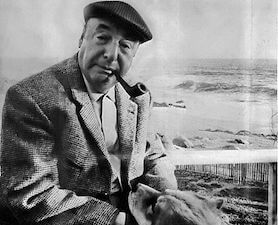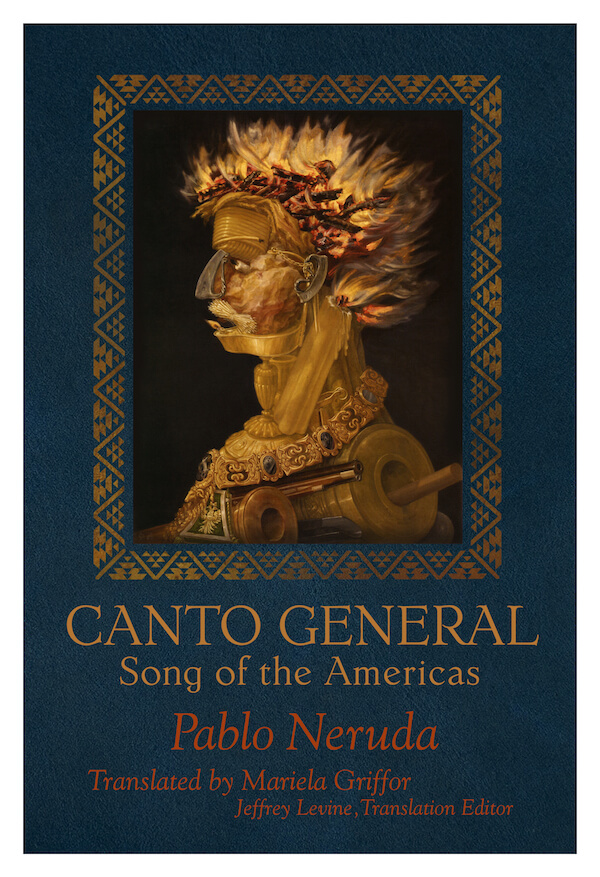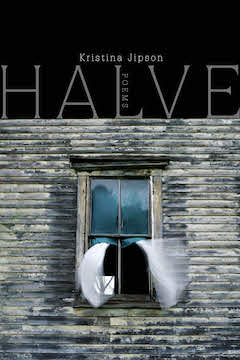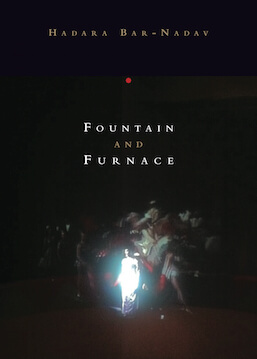“Those familiar with Canto General in Spanish are in no doubt that it is one of the masterpieces of the twentieth century, if not indeed the masterpiece. To English language readers the work in its entirety deserves to be much better known and this new translation is just what is needed. . .The reader is impelled as if by some kind of muscular but subtle music in or behind the lines. The book is aimed at readers whose knowledge of Spanish is not up to tackling Neruda directly, but such is the fluency of the translation that they will soon forget that they are in fact reading a translation.” — Robin Fulton Macpherson
“Pablo Neruda created his masterpiece Canto General from 1938 until 1950. . . Mariela Griffor’s translation, however, is only the second English translation of the entire Canto General. (The first was in 1993 by Jack Schmitt.) Given the prestige of the work and its sheer length, it’s no surprise that more translators have not taken on the task. For this alone, Griffor is to be applauded. It should also be noted here that this edition of the Canto appears only in English not in a bilingual edition and it’s easy to understand why since a Spanish-English version would have clocked in at over 1,000 pages.
. . . The (translator’s) introduction alone offers interesting reading. But in the text itself, the translator also makes Neruda’s verses sing for the reader. . .
Consider the beauty of the single line in the same opening section: “All is silence made of water and wind” (21). Though beautiful in Neruda’s Todo es silencio de agua y viento, the alliteration in English makes it even more wonderful.
. . .Griffor serves up her reader dozens and dozens of such gorgeous lines, stanzas, and poems ‘transcreated’ from Neruda and her work is truly worth serious attention from the reader.”
— Don Cellini , The Ofi Press issue 50
“The greatest poet of the twentieth century in any language.”
—Gabriel García Márquez, of Pablo Neruda
Pablo Neruda’s epic poem Canto General is a prodigious work that scrolls out like the chronicle of a journey through the Americas. In his most audacious and ambitious achievement, Neruda depicts history as a vast, continuous struggle against oppression. Constructed in fifteen parts, and made up of more than fifteen thousand lines, Canto General unfolds in successive epochs, celebrating the flora and fauna and geology of Neruda’s homeland and recounting episodes in the lives of explorers and conquistadors, emperors and dictators, revolutionaries and everyday laborers. Here is Canto General seen afresh, the breathtaking beauty of Neruda’s poetry fully revealed in English, with a new translation for the twenty-first century.
Chilean poet and diplomat Pablo Neruda (July 12, 1904— September 23, 1973), author of nearly forty books, was awarded the Nobel Prize for Literature in 1971.
About the author
 The great Chilean poet Pablo Neruda received the Nobel Prize in Literature in 1971, two years before his death at age 69. Called “The greatest poet of the twentieth century—in any language” by Gabriel Garcia Marquez, he is certainly one of the most important poets of the 20th century, and his Canto General – his Song of the Americas — is his greatest book. His breadth of vision and wide range of themes are extraordinary, and his work continues to inspire new generations of readers and writers.
The great Chilean poet Pablo Neruda received the Nobel Prize in Literature in 1971, two years before his death at age 69. Called “The greatest poet of the twentieth century—in any language” by Gabriel Garcia Marquez, he is certainly one of the most important poets of the 20th century, and his Canto General – his Song of the Americas — is his greatest book. His breadth of vision and wide range of themes are extraordinary, and his work continues to inspire new generations of readers and writers.
Neruda acknowledged the twofold path of his poetry when he wrote, “I have a pact of love with beauty: / I have a pact of blood with my people.” The earth’s glory was the portal to truth for Neruda, and his poems are as ravishing in the splendor of their brilliant metaphors and the eroticism of their luscious detail. The poet’s deep compassion for humankind, ardor for history, and attention to politics also inspired him to write incisively of conquistadors and tyrants, war and corporate imperialism. Passionate and prolific, Neruda himself was a force of nature, filling 35 books with poetry remarkable for its “simplicity, honesty, and conviction.”
About the translator
 Mariela Griffor, who translated Canto General, was born in the city of Concepción in southern Chile and attended the University of Santiago and the Catholic University of Rio de Janeiro. In 1985, she left Chile for an involuntary exile in Sweden, and now lives in the United States, in Washington DC and Michigan, where she is Honorary Consul of Chile. She holds a BA in Journalism from Wayne State University and a MFA in Creative Writing from New England College. She is founder of Marick Press and author of three books of poems,Exiliana, House, and The Psychiatrist.
Mariela Griffor, who translated Canto General, was born in the city of Concepción in southern Chile and attended the University of Santiago and the Catholic University of Rio de Janeiro. In 1985, she left Chile for an involuntary exile in Sweden, and now lives in the United States, in Washington DC and Michigan, where she is Honorary Consul of Chile. She holds a BA in Journalism from Wayne State University and a MFA in Creative Writing from New England College. She is founder of Marick Press and author of three books of poems,Exiliana, House, and The Psychiatrist.
About the translation editor
 Jeffrey Levine, who edited Canto General, is the editor-in-chief and publisher of Tupelo Press and author of two prize-winning books of poems, Rumor of Cortez and Mortal, Everlasting.
Jeffrey Levine, who edited Canto General, is the editor-in-chief and publisher of Tupelo Press and author of two prize-winning books of poems, Rumor of Cortez and Mortal, Everlasting.


 The great Chilean poet Pablo Neruda received the Nobel Prize in Literature in 1971, two years before his death at age 69. Called “The greatest poet of the twentieth century—in any language” by Gabriel Garcia Marquez, he is certainly one of the most important poets of the 20th century, and his Canto General – his Song of the Americas — is his greatest book. His breadth of vision and wide range of themes are extraordinary, and his work continues to inspire new generations of readers and writers.
The great Chilean poet Pablo Neruda received the Nobel Prize in Literature in 1971, two years before his death at age 69. Called “The greatest poet of the twentieth century—in any language” by Gabriel Garcia Marquez, he is certainly one of the most important poets of the 20th century, and his Canto General – his Song of the Americas — is his greatest book. His breadth of vision and wide range of themes are extraordinary, and his work continues to inspire new generations of readers and writers. Mariela Griffor, who translated Canto General, was born in the city of Concepción in southern Chile and attended the University of Santiago and the Catholic University of Rio de Janeiro. In 1985, she left Chile for an involuntary exile in Sweden, and now lives in the United States, in Washington DC and Michigan, where she is Honorary Consul of Chile. She holds a BA in Journalism from Wayne State University and a MFA in Creative Writing from New England College. She is founder of Marick Press and author of three books of poems,Exiliana, House, and The Psychiatrist.
Mariela Griffor, who translated Canto General, was born in the city of Concepción in southern Chile and attended the University of Santiago and the Catholic University of Rio de Janeiro. In 1985, she left Chile for an involuntary exile in Sweden, and now lives in the United States, in Washington DC and Michigan, where she is Honorary Consul of Chile. She holds a BA in Journalism from Wayne State University and a MFA in Creative Writing from New England College. She is founder of Marick Press and author of three books of poems,Exiliana, House, and The Psychiatrist. Jeffrey Levine, who edited Canto General, is the editor-in-chief and publisher of Tupelo Press and author of two prize-winning books of poems, Rumor of Cortez and Mortal, Everlasting.
Jeffrey Levine, who edited Canto General, is the editor-in-chief and publisher of Tupelo Press and author of two prize-winning books of poems, Rumor of Cortez and Mortal, Everlasting.


